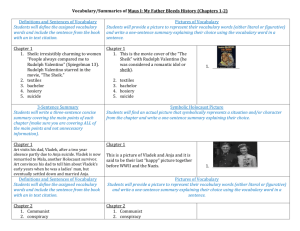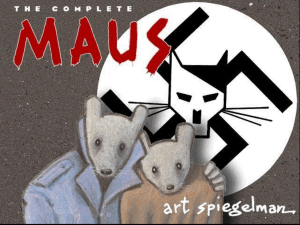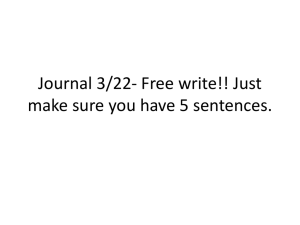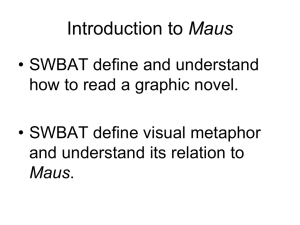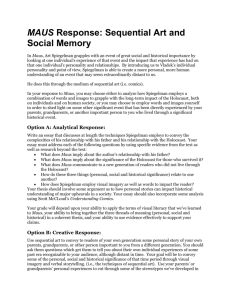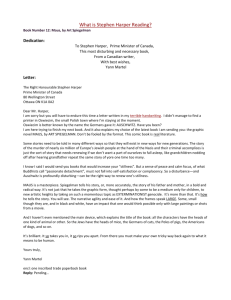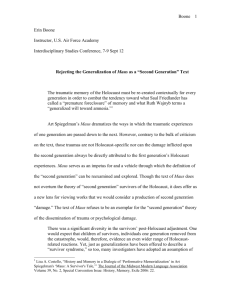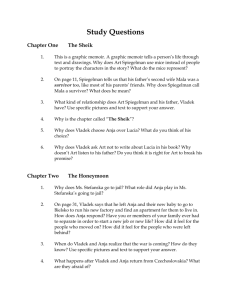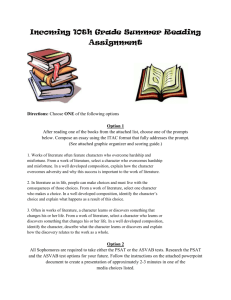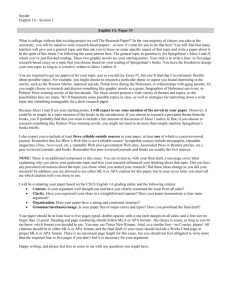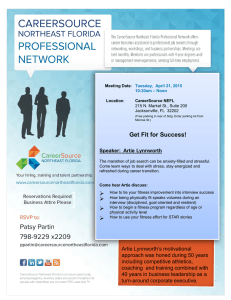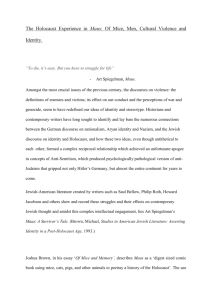Chapter Tests-Prologue, 1, and 2
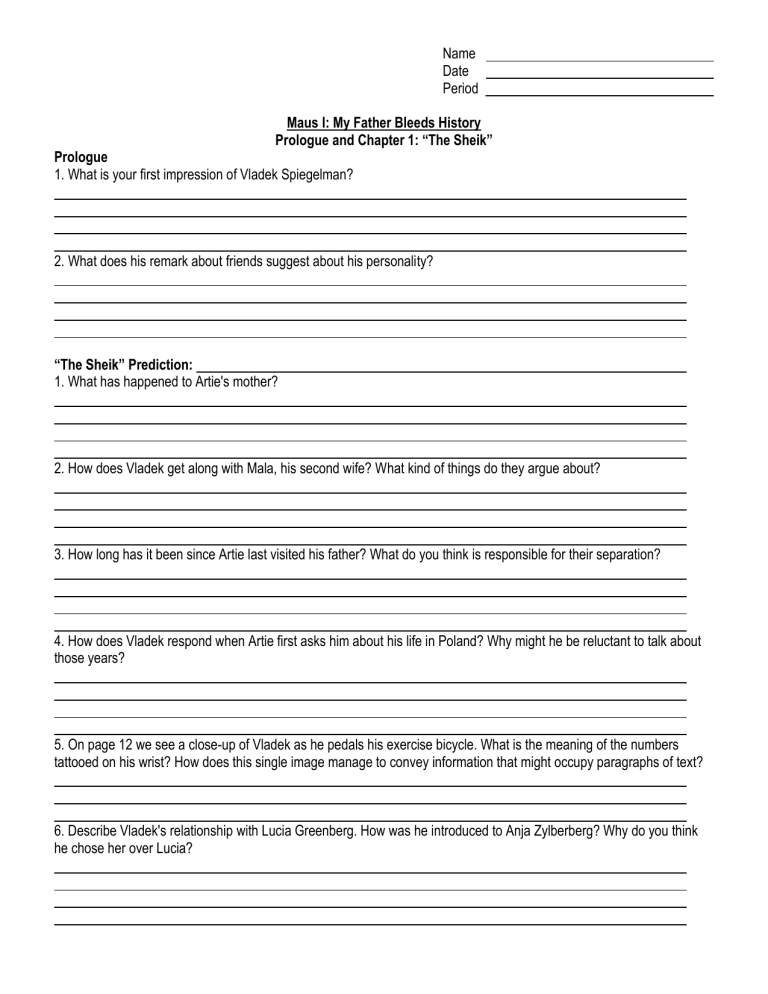
Name
Date
Period
Maus I: My Father Bleeds History
Prologue and Chapter 1: “The Sheik”
Prologue
1. What is your first impression of Vladek Spiegelman?
2. What does his remark about friends suggest about his personality?
“The Sheik” Prediction:
1. What has happened to Artie's mother?
2. How does Vladek get along with Mala, his second wife? What kind of things do they argue about?
3. How long has it been since Artie last visited his father? What do you think is responsible for their separation?
4. How does Vladek respond when Artie first asks him about his life in Poland? Why might he be reluctant to talk about those years?
5. On page 12 we see a close-up of Vladek as he pedals his exercise bicycle. What is the meaning of the numbers tattooed on his wrist? How does this single image manage to convey information that might occupy paragraphs of text?
6. Describe Vladek's relationship with Lucia Greenberg. How was he introduced to Anja Zylberberg? Why do you think he chose her over Lucia?
Name
Date
Period
Maus I: My Father Bleeds History
Prologue and Chapter 1: “The Sheik”
VocabularyStudents will define, write a sentence, and draw a nonlinguistic representation of the following vocabulary words.
1. sheik:
2. textiles:
3. bachelor:
4. hosiery:
5. suicide:
Literary DevicesStudents will give at least one example from the text (page number) for each literary term.
1. allegory:
2. flashback:
3. foreshadowing:
4. allusion:
5. irony:
6. theme:
Plot Summary-
Students will draw, label, and describe the plot for each chapter as if they were mini-short stories.
Name
Date
Period
Maus I: My Father Bleeds History
Chapter 2: “The Honeymoon”
“The Honeymoon” Prediction:
1. What is Vladek doing when Artie comes to visit him? How does his health figure elsewhere in the book?
2. How does Vladek become wealthy?
3. What does Vladek see while traveling through Czechoslovakia?
4. Why does the artist place a swastika in the background of the panels that depict the plight of Jews in Hitler's Germany
(p. 33)?
5. What other symbolic devices does the author use in this book?
Name
Date
Period
Maus I: My Father Bleeds History
Chapter 2: “The Honeymoon”
VocabularyStudents will define, write a sentence, and draw a nonlinguistic representation of the following vocabulary words.
1. communist:
2. conspiracy:
3. hysterical:
4. depressed:
5. sanitarium:
6. governess:
7. pogrom:
8. riot:
9. frontier:
10. cataract:
Literary DevicesStudents will give at least one example from the text (page number) for each literary term.
1. theme:
2. irony:
3. foreshadowing:
4. symbolism:
5. personification:
Plot SummaryStudents will draw, label, and describe the plot for each chapter as if they were mini-short stories.
Name
Date
Period
Maus I: My Father Bleeds History
Chapter 3: “Prisoner of War”
1. When Artie refused to finish his food as a child, what did Vladek do? How does he characterize Anja's leniency with their son?
2. Why was Vladek's father so reluctant to let him serve in the Polish army? What means did he use to keep him out?
3. What is the meaning of the beard and skullcap that Vladek's father is shown wearing in the panels on page 46? What happens to his beard later on?
4. How does Vladek feel after shooting the German soldier?
5. How did the Germans treat Vladek and other Jewish prisoners after transporting them to the Reich? How was this different from their treatment of Polish P.O.W.'s?
6. What is the significance of Vladek's dream about his grandfather? What recurring meaning does "Parshas Truma" have in his life?
7. How does Vladek arrange to be reunited with his wife and son? What visual device does Spiegelman use to show him disguising himself as a Polish Gentile?
Name
Date
Period
Maus I: My Father Bleeds History
Chapter 3: “Prisoner of War”
VocabularyStudents will define, write a sentence, and draw a nonlinguistic representation of the following vocabulary words.
1. herring:
2. delicate:
3. frostbite:
4. drafted:
5. Torah:
6. Parshas Truma:
7. Protectorate:
8. recuperate:
Literary DevicesStudents will give at least one example from the text (page number) for each literary term.
1. theme:
2. irony:
3. personification:
4. symbolism:
5. metaphor:
6. foreshadowing:
Plot Summary-
Students will draw, label, and describe the plot for each chapter as if they were mini-short stories.
Name
Date
Period
Maus I: My Father Bleeds History
Chapter 4: “The Noose Tightens”
1. Describe the activities depicted in the family dinner scene on pages 74-76. What do they tell you about the
Zylberbergs?
2. Although Jews were allowed only limited rations under the Nazi occupation, Vladek manages to circumvent these restrictions for a while. What methods does he use to support himself and his family?
3. During the brutal mass arrest depicted on page 80, Vladek is framed by a panel shaped like a Jewish star. How does this device express his situation at that moment?
4. What happened to little Richieu? When Vladek begins telling this story on page 81, the first three rows of panels are set in the past, while the bottom three panels return us to the present and show the old Vladek pedaling his stationary bicycle. Why do you think Spiegelman chooses to conclude this anecdote in this manner?
5. What happened to Vladek's father? What does the scene on pages 90-91 suggest about the ways in which some
Jews died and others survived?
Name
Date
Period
Maus I: My Father Bleeds History
Chapter 5: “Mouse Holes”
VocabularyStudents will define, write a sentence, and draw a nonlinguistic representation of the following vocabulary words.
1. noose:
2. gallstones:
3. Zionist:
4. convalescent home:
5. deported:
6. suffocated:
7. smuggle:
8. vaguely:
Literary DevicesStudents will give at least one example from the text (page number) for each literary term.
1. metaphor:
2. simile:
3. foreshadowing:
4. symbolism:
5. irony:
Plot SummaryStudents will draw, label, and describe the plot for each chapter as if they were mini-short stories.
Name
Date
Period
Maus I: My Father Bleeds History
Chapter 5: “Mouse Holes”
1. This chapter and the one that follows both have the word "mouse" in their titles. In fact, in the concluding sections of this book, Spiegelman's mice seem to become more "mouse-like." How does the author accomplish this? What reason might he have for doing so?
2. Why does Artie claim that he became an artist?
3. How does the comic strip "Prisoner on the Hell Planet" depict Artie and his family? How did you feel on learning that
Artie has been hospitalized for a nervous breakdown? Why do you think he has chosen to draw himself dressed in a prison uniform? What is the effect of seeing these mice suddenly represented as human beings?
4. Why did Anja finally consent to send Richieu away? Was his death "better" than the fate of the children depicted on page 108?
5. Describe the strategies that Vladek used to conceal Anja and himself during the liquidation of the ghetto. How did the
Germans flush them from hiding?
6. What eventually happens to the "mouse" who informed on the Spiegelmans? What becomes of Haskel, who refused to save Vladek's in-laws even though he accepted their jewels?
7. What does the incident on pages 118 and 119 tell us about relations between Jews and Germans? Does the knowledge that some Nazis fraternized with their victims make their crimes more or less horrible?
Name
Date
Period
8. How did Vladek care for Anja after the destruction of the Srodula ghetto? Contrast his behavior toward his first wife, during the worst years of the war, with the way he now treats Mala.
Mouse Trap: Chapter 6
1. What does Vladek mean when he says that reading Artie's comic makes him "interested" in his own story (p. 133)? Is this statement just a product of broken English, or does it reveal some deeper truth about what happens when we record our personal histories?
2. On page 136 Vladek says that he was able to pass for a member of the Gestapo but that Anja's appearance was more Jewish. What visual device does Spiegelman use to show the difference between them?
3. Given the fact that the Spiegelmans are "mice," what is the significance of the panels on page 147, in which Vladek and Anja's hiding place turns out to be infested with rats? Why might the author have portrayed this incident?
4. On page 149 Vladek is almost betrayed by a group of schoolchildren. What stories did Poles tell their children about
Jews? How do you think such stories—and perhaps similar stories told by German parents—helped pave the way for the
Final Solution?
5. Why does Vladek want to flee to Hungary? How are he and Anja eventually captured? What is the significance of the letter from Mandelbaum's nephew (p. 154)?
6. Why does Artie call his father a murderer? Is he justified? Who else has he called a murderer, and why?
Name
Date
Period
Characterization
Maus I: My Father Bleeds History
1. What kind of man—or mouse—is Vladek Spiegelman? What details does Spiegelman use to establish his character?
What traits do you think enabled him to survive events in which the overwhelming majority of Jews were killed?
2. The opening pages of Maus portray Vladek Spiegelman as an old man. Only later, when Vladek is telling his story, do we see him as he was in his thirties. What differences do you see between the old Vladek and the young one who emerges in his memories? How do you account for these changes in his character?
3. How does Spiegelman establish the old Vladek's "foreignness"? In what specific ways, for example, does his speech differ from his son's? Why does the author show the young, remembered Vladek, as well as his family, speaking
"normal" English?
4. How would you sum up the character of Artie? How would you compare him with his father? What things about Vladek irritate him? Which of Artie's traits does Vladek seem incapable of understanding? In what ways do you think Vladek has influenced his son?
5. How does the author portray Anja as a young woman, and later as a depressed and suicidal older one? How are your earlier perceptions of her altered by the comic-within-a-comic "Prisoner on the Hell Planet"? If Anja had written a suicide note, what might it have said?
Optional Essays
Maus I: My Father Bleeds History
Due:
1. What does Maus do that pure text narratives cannot? In what ways do Spiegelman's crude drawings help us visualize things that words alone, or more "realistic" images, might be unable to portray? How does Maus differ, both in its subject matter and visual format, from other comic books you have read?
2. One of the problems inherent in representing human beings as cats and mice is that animals have a narrower range of facial expression. Are Spiegelman's animals as emotionally expressive as human characters might be? If so, what means does the cartoonist use to endow his mice and cats with "human" characteristics?
3. On page 23, Vladek asks his son to refrain from telling the story of his youthful involvement with Lucia Greenberg, claiming that "it has nothing to do with Hitler, with the Holocaust." Artie argues that this story "makes everything more human." Which of these statements do you agree with? Should the Holocaust be treated as an event so catastrophic that it makes private experience irrelevant? How do other books and films about the Holocaust, like Schindler's List,
Night, or The Painted Bird, deal with this predicament?
Name
Date
Period
4. Maus contains several moments of comedy. Most of these take place during the exchanges between Artie, Vladek, and Mala. But humor even finds a place in the ghetto and the bunker, for example on page 119, when the cake sold to the starving Jews of Srodula turns out to have been made with laundry soap. What is the effect of this humor? Was it inaccurate or "wrong" of Spiegelman to have included such episodes within his survivor's tale?
5. The situation of Polish Jews worsens steadily and dramatically throughout Maus, a deterioration that is aptly summed up by the chapter heading "The Noose Tightens." Chart the progress of this escalation, citing specific incidents in the book. What happens to Spiegelman's mice as they are forced deeper into "mouse holes"? In what way do they become more "mouse-like"? How might they have responded differently if the Germans had begun their program of mass extermination from the start?
6. Most art and literature about the Holocaust is governed by certain unspoken rules. Among these are the notions that the Holocaust must be portrayed as an utterly unique event; that it must be depicted with scrupulous accuracy, and with the utmost seriousness, so as not to obscure its enormity or dishonor its dead. In what way does Maus obey, violate, or disprove these "rules"?
